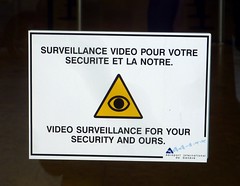December 02, 2010
Conspiring against the conspiracies
 State and Terrorist Conspiracies by Julian Assange (PDF, via zunguzungu) makes an interesting and in retrospect somewhat obvious point:
State and Terrorist Conspiracies by Julian Assange (PDF, via zunguzungu) makes an interesting and in retrospect somewhat obvious point:
Conspiracies are cognitive devices. They are able to out think the same group of individuals acting alone Conspiracies take information about the world in which they operate (the conspiratorial environment), pass it around the conspirators and then act on the result. We can see conspiracies as a type of device that has inputs (information about the environment) and outputs (actions intending to change or maintain the environment).
In short, conspiracies are a kind of collective intelligence enhancement.
His network model of conspiracies certainly fit in with our times (everything is a network, social or not, these days) but it is not clear that his model of conspiratorial power as the sum of graph weights actually has much meaning. A conspiracy with an infeasible goal (let's summon Cthulhu to destroy the world!) might have very strong internal links and plenty of coordination, yet its actual power is minimal. Similarly a conspiracy with faulty cognitive structure doesn't benefit from the coordination possibilities - if the old guard systematically ignore certain disconfirming information it might not matter if the agents produce enormous amounts of important input, since it will not help compute the next action. Real conspiratorial power is likely problem dependent: a Luttwakian coup d'Etat requires not just conspiratorial coordination but also command power over certain key assets, while implementing a propaganda strategy requires a different set of assets and coordination structures, and the same conspiracy might have vastly different power in these cases.
Assange argues that traditional attacks on nodes or links are not very effective (they are after all often hidden and the network might be resilient), while conspiracies have been empowered by literacy and the communications revolution. However, this misses the counterconspiracy effect: it has become easier to set up conspiracies of all kinds for most people. This means that the environment the conspiracy has to act in also becomes more complex: it is not just a risk of disclosure (which triggers resistance and is Assange's main point, of course) but there are going to be hidden networks acting counter to the conspiracy's goals that are hard to identify and handle. While the conspiracy of the powerful against the less powerful has an advantage it might not be as big as it once could have been. Part of it is the effect of transparency he discusses ("in a world where leaking is easy, secretive or unjust systems are nonlinearly hit relative to open, just systems."), but part of it is just that the world got even harder to control.
An interesting question is whether a more transparent society necessarily becomes safer from conspiracies. The noise level might go up so that only networks that are able to see through enough of the noise will be able to act effectively. It is not clear that transparency fixes authoritarian conspiracy if it gets lost in the noise.
I am reminded by Heylighen's paper Complexity and Information Overload in Society: why increasing efficiency leads to decreasing control. We are seeing a kind of race between information overload and amplified intelligence, but actions that amplify intelligence increase overload. One reason authoritarian governments and other groups like to control information might simply be to retain their control ability: as long as there is little information they have the best collective enhancement (they think), but with more open information everybody is essentially on the same level. The scary possibility is that people might invent better conspiracies that work at higher noise levels: such conspiracies might retain the authoritarian advantage while keeping everybody else trapped in the noise.
Posted by Anders3 at December 2, 2010 03:39 PM